The Keyword Golden Ratio (KGR) is a formula for finding keywords that are underserved on the internet.
When you target Keyword Golden Ratio phrases, you can expect your page to rank within the top 50 positions within a few days.
In this article, you’ll discover:
- what the Keyword Golden Ratio is
- how to find KGR keywords
- tips for using KGR keywords
- three case studies of websites that grew their traffic and income with KGR keywords
- some KGR keyword tools
But first of all, what exactly is KGR?
What is the Keyword Golden Ratio?
The Keyword Golden Ratio (KGR) is a data-driven technique for finding keywords that you can rank for quickly because they are overlooked and have very little competition.
The term ‘keyword golden ratio’ was coined by Doug Cunnington of Niche Site Project who discovered the formula for finding these under-used, low competition keywords.
Put simply, the formula for finding KGR keywords is “number of ‘allintitle’ search results” divided by “monthly search volume” (MSV) where MSV is less than 250 :
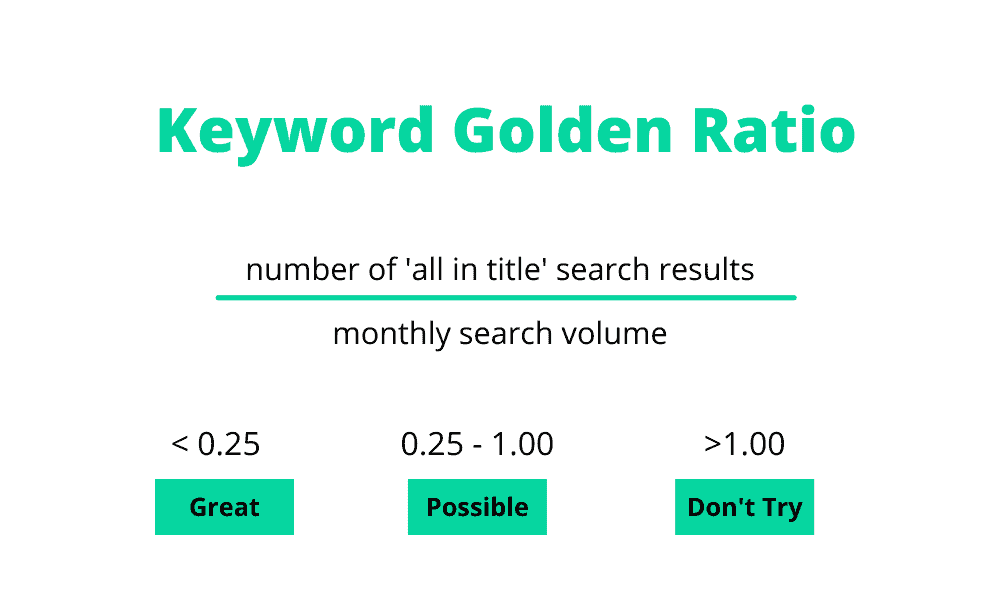
If the result of that formula is:
- Less than 0.25 – that’s a KGR keyword and you’re good to go
- 0.25 to 1.00 – it’s still worth a shot
- More than 1.00 – don’t bother trying (it’s too competitive)
Wondering what ‘allintitle’ is?
It’s an advanced Google search operator that specifies that all the words must be in the meta title of the web page.
This is what an ‘allintitle’ search looks like:
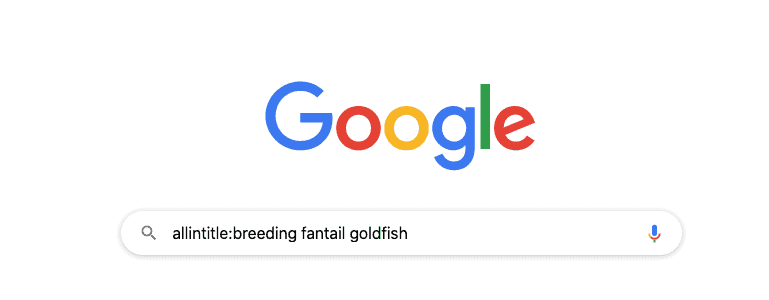
Important:
- don’t enclose your keywords in inverted commas, and
- don’t leave a space between ‘allintitle’ and the first word of your keyword phrase.
Why Use KGR Keywords?
Overlooked keywords with low competition are a bonanza for anyone. But they are particularly valuable for new websites that don’t yet have the domain authority (DA) to rank for more competitive keywords.
You can often rank for KGR keywords within a few days and without building backlinks to your article. So these are great keywords if you need to get some “runs on the board” quickly.
KGR keywords are especially valuable for owners of new websites who need some quick SEO wins in order to stay motivated. They’re also useful if you have a long list of potential keywords and you need to prioritize which keywords to focus on first.
How To Find KGR Keywords
In this quick tutorial, I’m going to show you how to find KGR keywords using KWFinder.
Let’s say you have a DIY blog or website and you want to write a blog post on the general topic of ‘DIY tiling tips’.
Go to the KWFinder Tool and type in ‘diy tiling tips’. Then click on ‘Related Keywords’ and then click ‘Filter’:
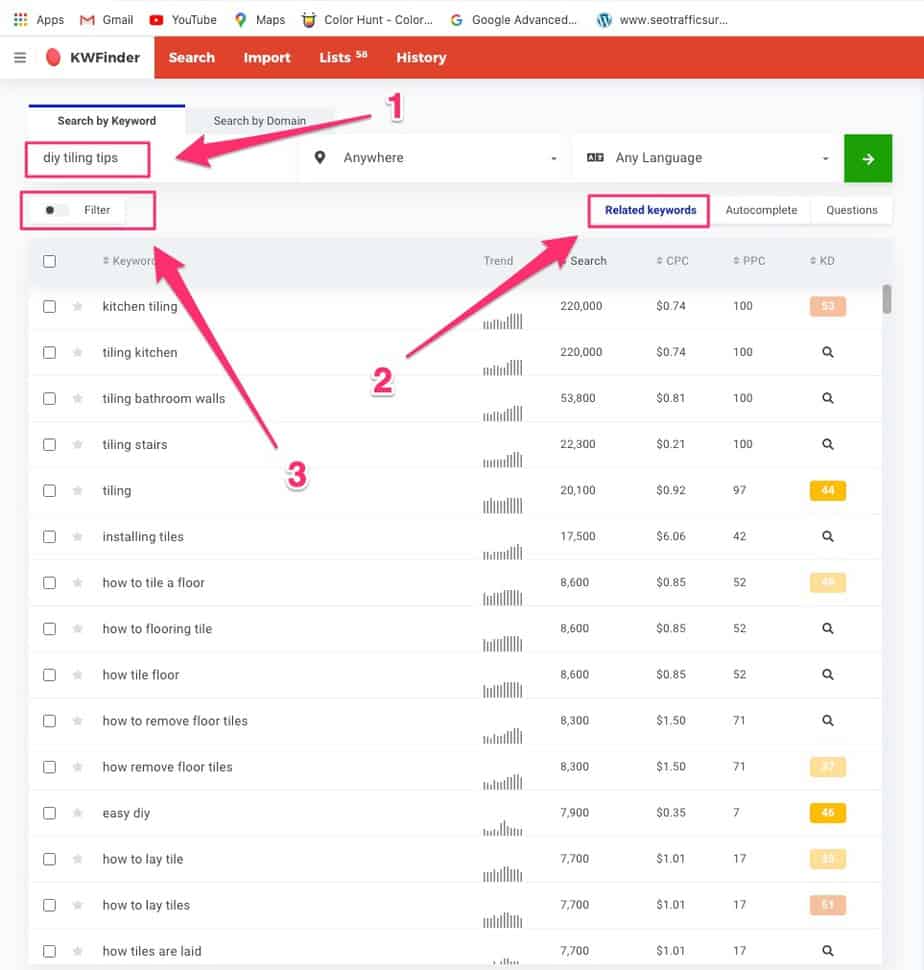
In the Filter, set the maximum monthly search volume to 250 and then toggle the filter to ‘On’:
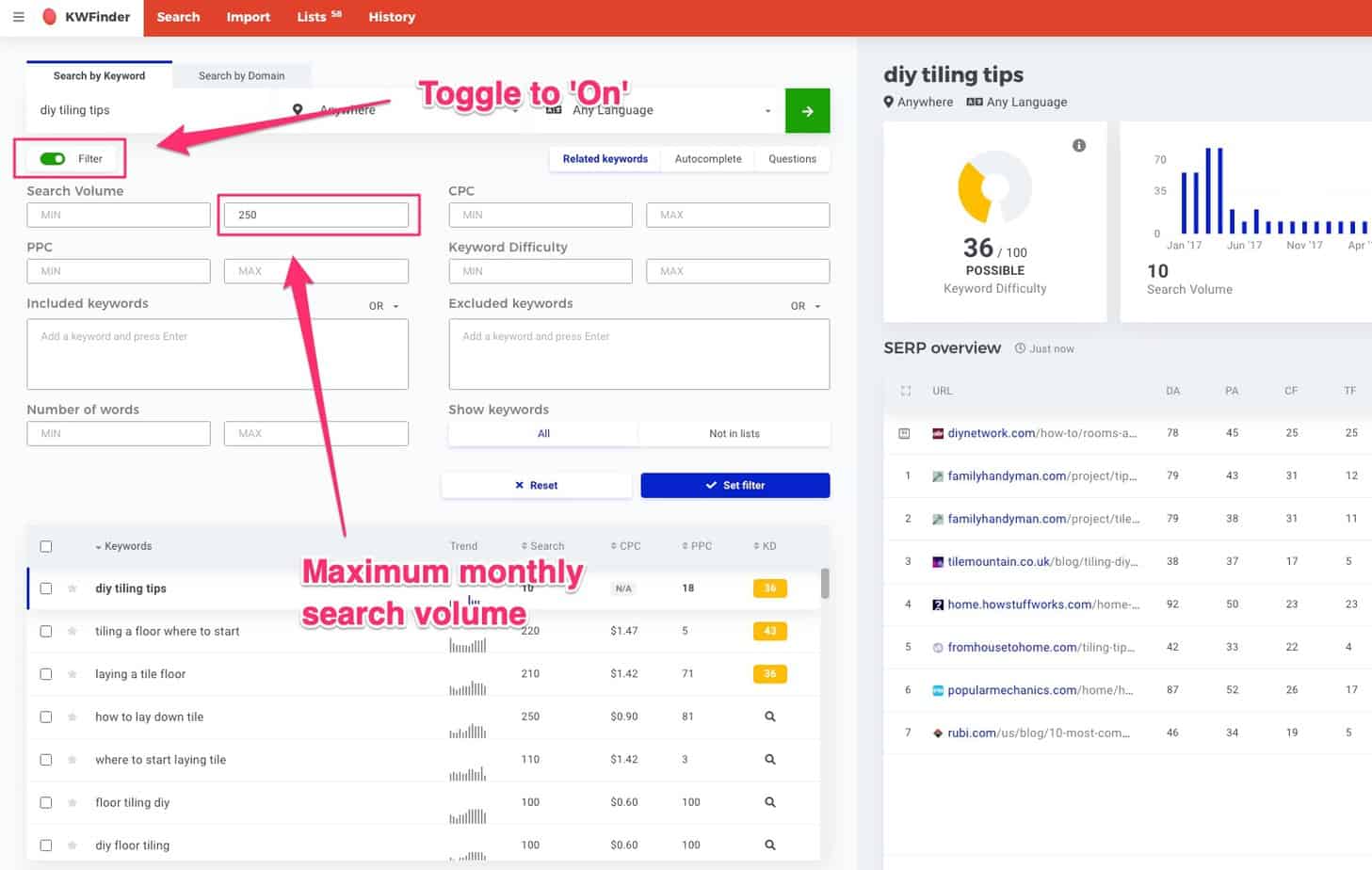
Next, order the search volume column from high to low:
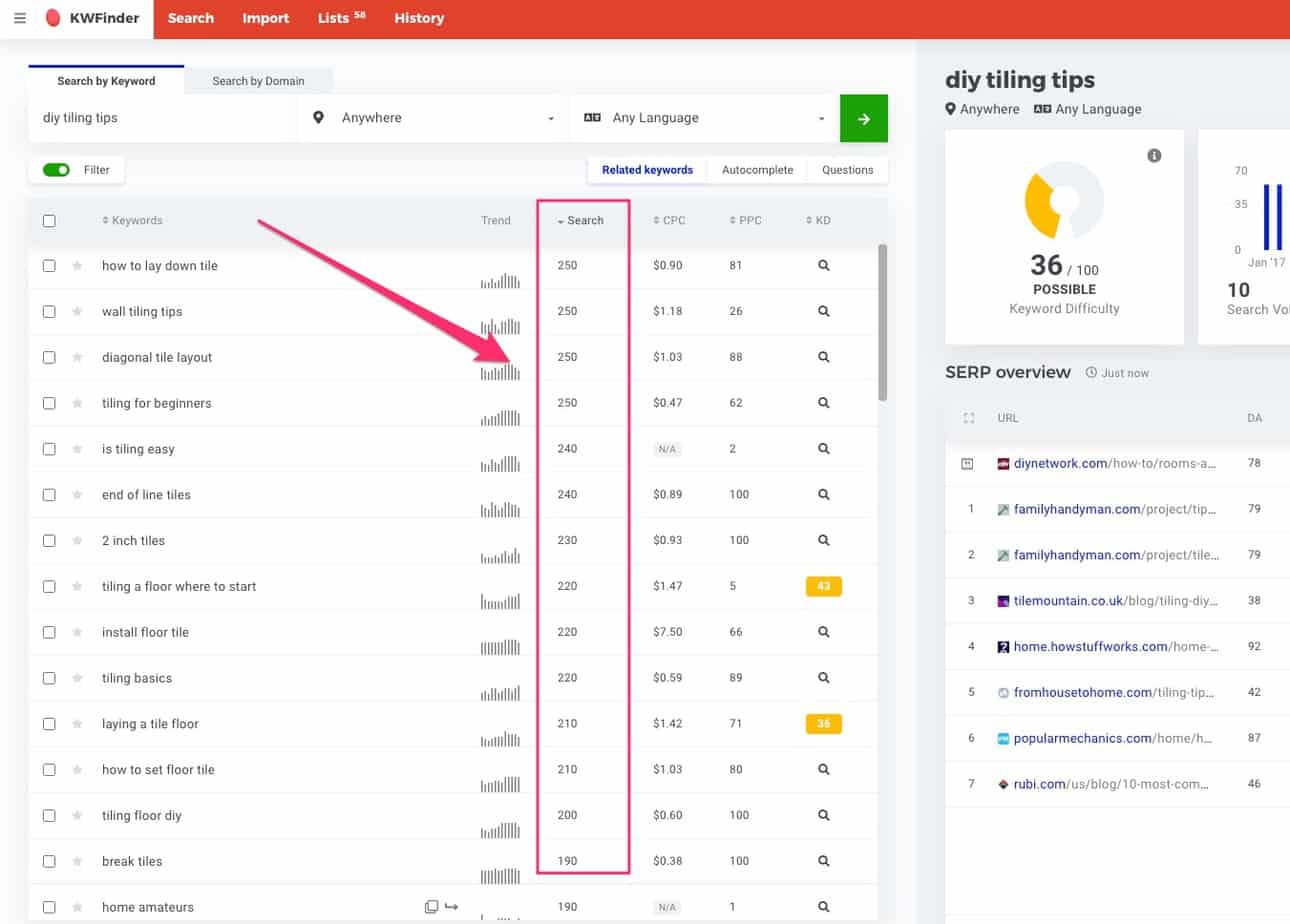
Next, choose a keyword:
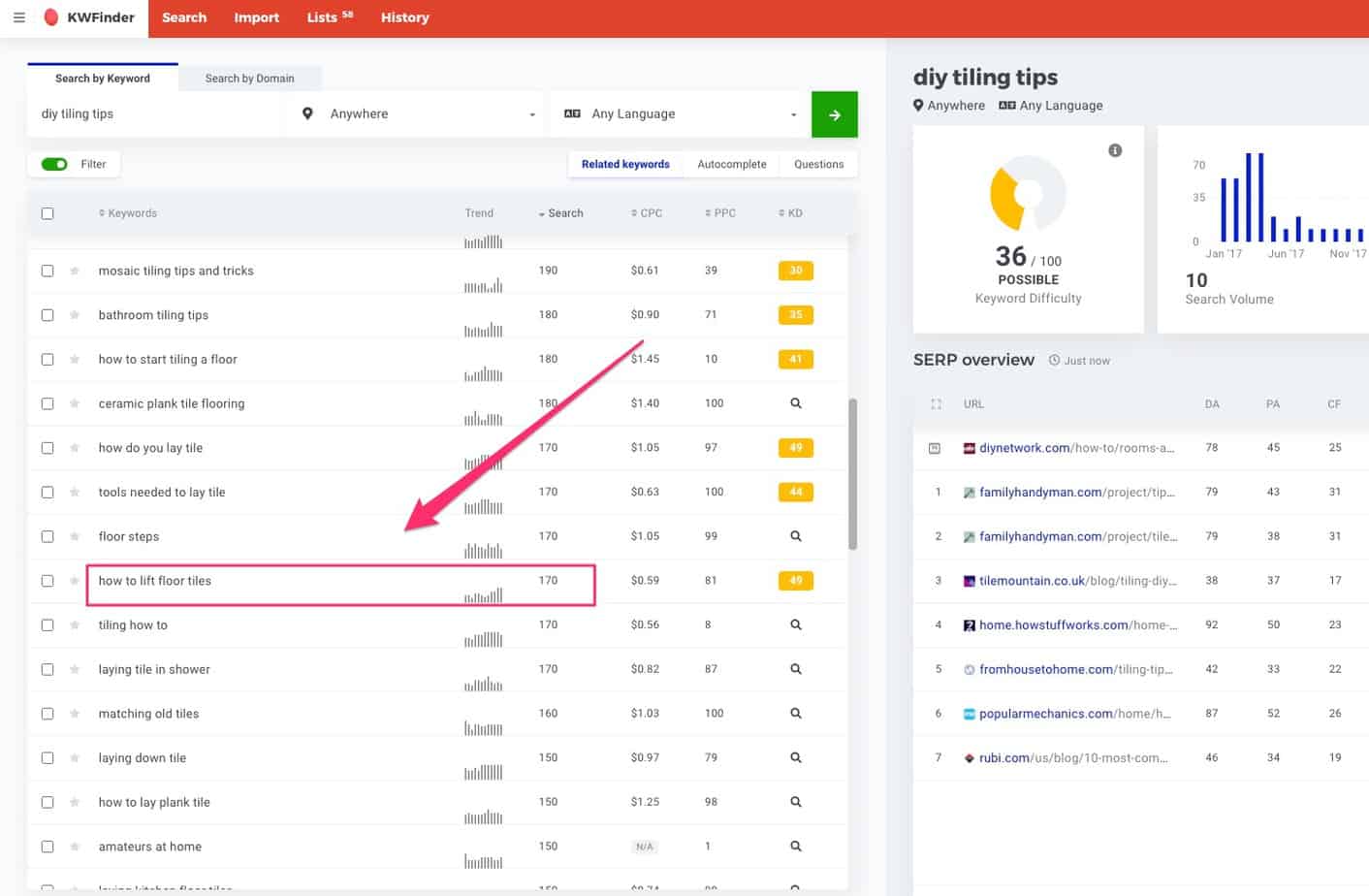
And then type it into Google Search, using the ‘allintitle’ search operator.
Then make a note of the number of results:
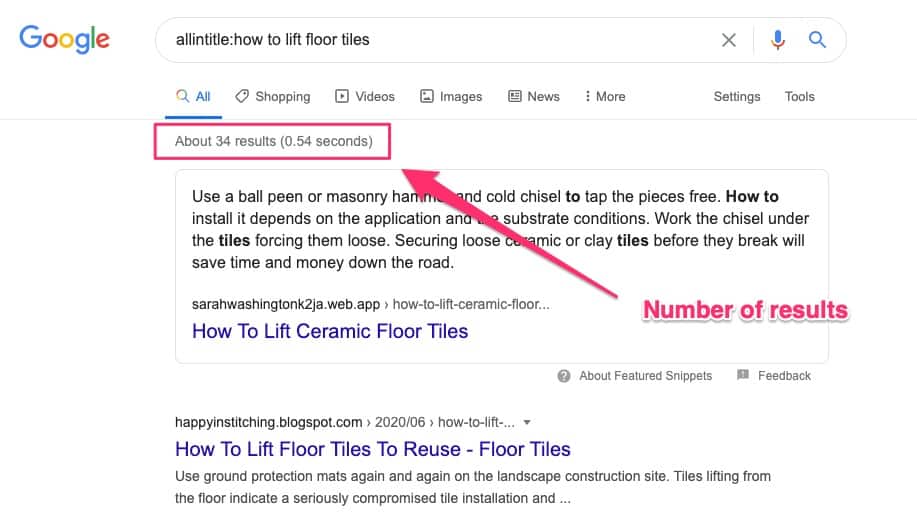
And then divide the number of results by the monthly search volume. In this case, it’s 34 (number of results) divided by 170 (monthly search volume) and the result is 0.2:
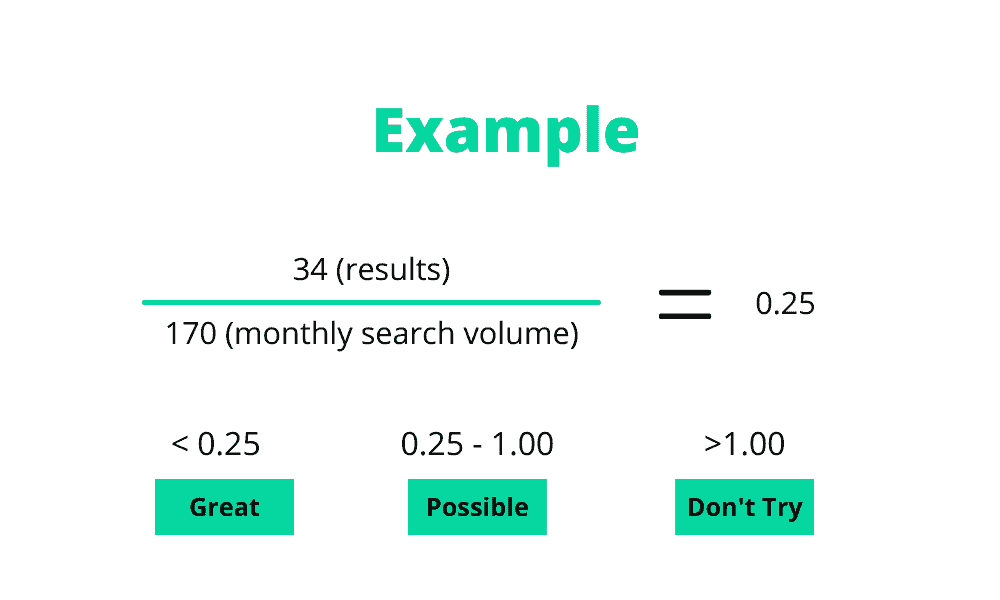
The result is less than 0.25 so it’s an ideal KGR keyword.
Be aware that this can be somewhat time-consuming: it took me about 7 attempts to find that keyword. But the rewards are worth the effort!
Prefer to watch a video?
5 Tips For Using KGR Keywords
Tip #1: Remember there’s an upper limit of 250 monthly searches – if you use monthly search volumes higher than that, the technique won’t work
Tip #2: The more words in your keyword phrase, the better the technique works. If you need to add words to your keyword, try using keyword modifiers like why, when, how, what, best way, problem, get rid of, sizes, list, etc.
Tip #3: Because they are so long, KGR keywords are hard to use without sounding unnatural. So don’t force it. Just make sure to include your KGR word once in the title and once in the body of the article.
Tip #4: In general, a keyword with less than 70 results in an ‘allintitle’ search is a good candidate for a KGR keyword.
Tip #5: It’s much easier to find KGR keywords relating to information than to products. That being the case, a good strategy is to take pages built around information-related KGR keywords and link them to your product pages. That way, the information pages will bolster the authority of your product pages.
KGR Case Studies
Sounds good in theory, but does it actually work?
Absolutely! As you can see in the following three case studies.
Case Study #1 – Evan Porter
Evan Porter is a copywriter and content strategist. In mid-2017 he started a health and fitness blog. Between February and July 2018, he wrote 61 KGR compliant articles.
This was the result, in terms of traffic:
And this was the result in terms of his Amazon affiliate income:
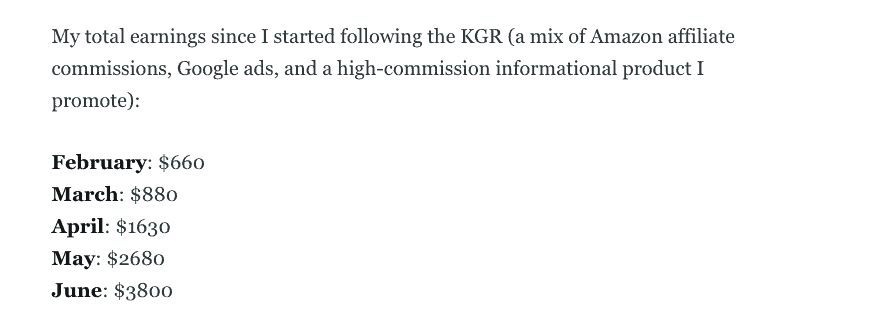
Evan offers three key takeaways from his experience with KGR keywords:
- It’s a technique designed to be used at scale (you need a lot of KGR-optimized pages)
- Taken individually, the results of any single KGR page may seem small, but together they create a steady flow of reliable traffic
- For a brand-new website in a competitive niche, KGR-optimized pages are the best way to get the ball rolling with your traffic.
Case Study #2 – Ellen
Ellen is a former social worker who started a niche travel site and used the KGR content strategy. Within 8 months she reached 2000 pageviews a day and averaged $3000 per month as an Amazon affiliate:
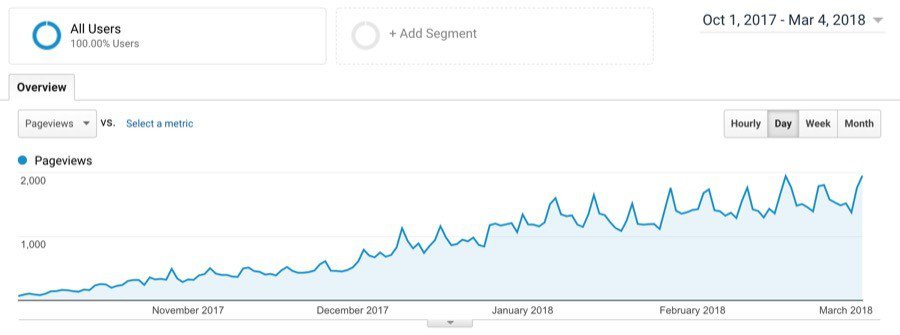
For more details, see this case study, on Ellen’s use of the KGR keyword technique.
Case Study #3 – Jaron
Jaron also started a niche site using the KGR content strategy and within 4 months he was making $100+ per month.
That figure has since grown to $350 per month.
It’s worth noting that Jaron did this without building backlinks whatsoever – his results were based entirely on finding under-served keywords using the KGR formula.
For more details, see this case study on Jaron’s use of the KGR technique.
Keyword Golden Ratio Tools
There are several KGR tools available but I believe that KGR keyword research is best done manually.
The reason for this is quite simple. The whole point of KGR keywords is to find neglected keywords where the content in Google is very thin or non-existent.
In other words, it’s about getting off ‘the beaten track’
But the moment you start using a tool, you begin following a well-worn path. In other words, when you use a tool, you’ll be chasing keywords that other people have already found and targeted.
With that said, here are some KGR tools.
Allintitle
Allintitle is a bulk allintitle KGR checker and KW explorer. This is a normal keyword research tool where you type in a seed word and it gives you long-tail keywords associated with the seed word. For each of the suggested keywords, it gives you a range of metrics. And one of those metrics is the KGR score for that keyword:
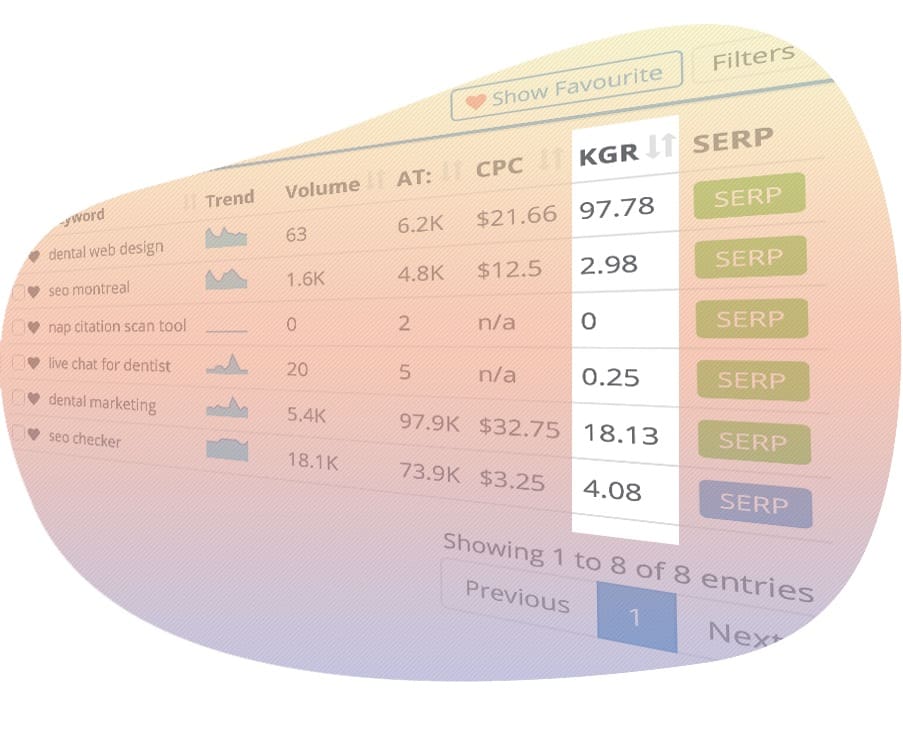
Allintitle has pay-as-you-go pricing, where you buy tokens:
- Free = $0 (10 tokens)
- Small = $30 (600 tokens)
- Medium = $75 (1500 tokens)
- Large = $150 (3000 tokens)
KGR Google Sheet Calculator
This is a free KGR calculator spreadsheet designed to be used in conjunction with the free Chrome extension ‘Keywords Everywhere’.
The spreadsheet saves you time by turning keywords into a ready-made ‘allintitle’ Google search query. All you then have to do is copy the number of search results into the corresponding cell in the spreadsheet. If the cell turns green, you have a KGR keyword; if it turns red, it’s not a KGR keyword.
Niche Site Project’s KGR Calculator
This is a Google spreadsheet created by Doug Cunnington, the inventor of the KGR formula.
With Doug’s calculator, you just type in your long-tail keyword and the ‘search string’ column will turn it into a Google ‘allintitle’ search string.
Then enter the number of search results for that keyword followed by the monthly search volume (taken from your preferred keyword tool) and the cell in the KGR column will go green if it’s a KGR keyword.
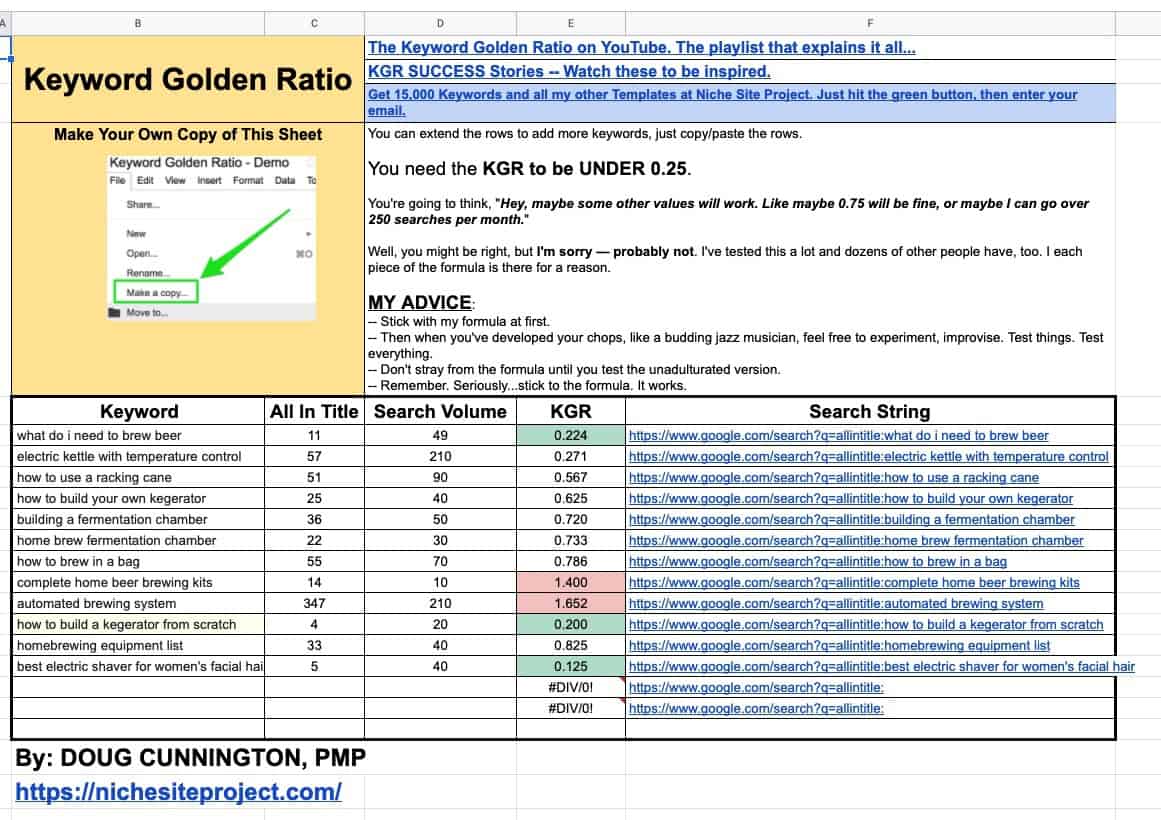
As you can see, there’s still some manual work to do on your part, but the spreadsheet calculator will certainly save you a lot of time.
Conclusion
If you’re starting out with a new website and you don’t have any backlinks and zero or low domain authority, then the Keyword Golden Ratio (KGR) is a lifeline. Depending on the KGR words you choose, you may be able to rank your pages on Google in a matter of hours.
This is a way of finding overlooked, underserved keywords and so it’s a technique worth trying even if you have an established website.
More Articles About Keyword Research
- How To Use Keyword Modifiers To Rank on Google
- How to Find Seed Keywords for Better SEO (2 Simple Methods)
- What Is a Focus Keyword – 7 Tips For Better SEO
- How To Find Long Tail Keywords Using Free & Paid Tools
- How To Rank for Multiple Keywords and Triple Your Traffic
- 21 Types of Keywords in SEO & How To Use Them
- What Are Stop Words In SEO – Everything You Need To Know
- High Intent Keywords – What They Are & How To Use Them
- How To Use ‘People Also Ask’ (PAA) For Better SEO
- What Are LSI Keywords & How To Use Them To Rank Higher
- What Is Keyword Research – A Guide For Beginners (2022)
- What Is Keyword Grouping & How Does It Help With SEO?
